Mucus, often seen as a mere inconvenience during cold and flu season, is actually a complex and essential component of human health. Recent research has shed light on the myriad roles of mucus, particularly focusing on its major component – sugar-coated proteins called mucins. These proteins play a crucial role in regulating the transport of small molecules and particulates to epithelial cells that line the respiratory and digestive tracts. However, beyond acting as a physical barrier, mucus and mucins have been found to be biologically active, influencing immunity, cell behavior, and defense against pathogens and even cancer.
One of the key challenges in studying mucus and mucins lies in their diverse protein structures. Humans possess more than 20 mucin genes, each expressed differently in various tissues, leading to a wide range of protein variations. Moreover, cells modify these proteins by attaching different sugars, a process influenced by genetic, dietary, and environmental factors. This complexity results in significant variability in mucus composition from person to person, making it challenging to pinpoint the specific biological effects of individual mucins.
To overcome the limitations in studying natural mucus, researchers have turned to the synthesis of mucins. By combining synthetic chemistry and bacterial enzymes, scientists have been able to create unique synthetic mucins that mimic natural structures. This approach allows for the investigation of the physical, chemical, and biological properties of individual mucin molecules, offering insights into the impact of altering sugar or protein sequences.
The ability to manipulate mucin structures has opened up new avenues in cancer research. Scientists are now exploring the influence of mucins on tumor formation, particularly in the early stages of cancer development. Previous studies have indicated that mucins present on cancer cells can promote metastasis and hinder immune cell activation, facilitating cancer progression. By using synthetic mucins, researchers aim to understand how specific chemical properties of these proteins can affect cancer cell behavior, potentially paving the way for targeted cancer treatments.
Beyond cancer research, synthetic mucins offer promising prospects in various fields. These molecules could be developed as anti-infectives, probiotics, or therapies supporting reproductive and women’s health. The ability to modify protein sequences and sugars in a controlled manner allows for the production of scalable quantities of synthetic mucins, unlocking a range of potential applications in healthcare.
Mucus is far more than just a sticky substance; it is a complex entity with multifaceted roles in human health. Through innovative research methods like synthetic mucin synthesis, scientists are uncovering new insights into the biological functions of mucus and its implications for various diseases. The future holds exciting possibilities for the use of synthetic mucins in developing targeted therapeutics and improving overall health outcomes.


Leave a Reply